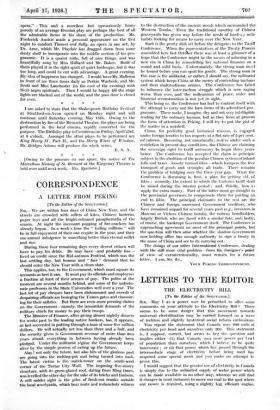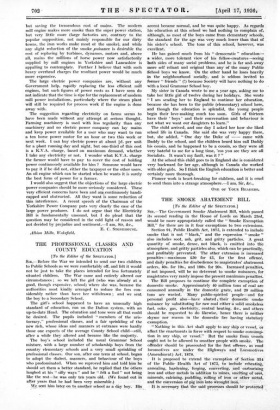LETTERS TO THE EDITOR
THE ELECTRICITY BILL
[To the Editor of the SPECTATOR.]
Sin,--May I as -a power user be permitted to offer. some comments on your attitude to- the Electricity Bill ? There seems to be some danger that this movement towards universal electrification may be carried forward. on a wave of reckless and slightly hysterical social reform enthusiasm.
• You repeat the statement that Canada uses 800 units of electricity per head and ourselves .only 200. This statement is, I suppose, correct, but seems to beg the question and implies either—(1) that Canada uses more power per 'teal of population than ourselves, which I believe to be quite inaccurate ; or (2) that power which -has passed through-the intermediate stage of electricity before being used has acquired some special merit and you make no attempt to prove this.
I would suggest that the greater use of electricity in Canada is simply due to the unlimited supply of water power- which can be made available in no-other way; whereas we still find it cheaper in most instances to move our coal to the spot where our Dower is required, -using a slightly lac efficient enaine, but saving the tremendous cost of mains. The modern mill engine makes more smoke than the super power station, but very little more (large factories are, contrary to, the popular supposition, not mainly responsible for our dirty towns; the iron works make most of the smoke), and while any slight reduction of the smoke /nuisance is desirable the cost of replacing by turbines, dynamos, motors and, above all, mains the millions of horse power now satisfactorily supplied by mill engines in Yorkshire and Lancashire is appalling to contemvlate. Further I believe that with such heavy overhead charges the resultant power would be much more expensive.
The large electric power companies are, without any Government help, rapidly replacing the less efficient mill engines, but such figures of power costs as I have seen do not indicate that the time is ripe for the replacement of modern mill power installations, particularly where the steam plant will still be required for process work if the engine is done away with.
The suggestion regarding electricity on farms seems to have been made without any attempt at serious thought. Farming machinery is used with less regularity than any machinery and no electric power company can lay mains and keep power available for a user who may want to run a ten horse power motor for an hour or two this week or next week. I can buy electric power at about id. per unit for a plant running day and night, but one-third of this cost is a K.V.A. charge, based on maximum demand, whether I take any electricity or not. I wonder what K.V.A. charge the farmer would have to pay to cover the cost of holding power continuously available for him ? Someone would have to pay it if he did not, either the taxpayer or the other users. An oil engine which can be started when he wants it is surely the best form of power for a farmer.
I would also suggest that the objections of the large electric power companies should be more seriously considered. These very efficient concerns have been and awcontinuously handi- capped and obstructed. All they want is some reduction of this interference. A recent speech of the Chairman of the Yorkshire Power Company puts very clearly the case of the large power producer. I do not argue that the Electricity Bill is fundamentally unsound, but I do plead that the question may be considered in the cold light of reason and not decided by prejudice and sentiment.—I am, Sir, &c.,



























































 Previous page
Previous page